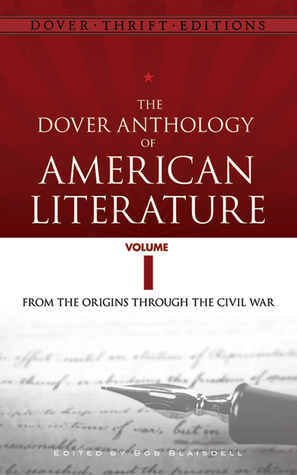THE DOVER ANTHOLOGY OF AMERICAN LITERATURE VOLUME I - Bob Blaisell, editor
I never thought I'd read a book like this once I graduated from college, but here I am, delving into the past and reading an assortment of classic, American works.
For a bibliophile such as myself, I find that there are more classic works of literature that I want to read, but because of all the new books I also want to read, there is just not enough time. Enter an anthology such as this that provides pieces of longer, classic works. Editor Bob Blaisdell has collected a strong selection of works that really capture the early days of the United States from a literary perspective.I was familiar with many of the works included here (and have previously read a few of these) but by no means was I even aware of all of these. If you know me or have been subscribing to my blog, then it should be no surprise that my least favorite works here are the poems. (Sorry poetry fans ... I just don't care for poetry.)
Generally speaking, my favorite works here are those by Indigenous authors. Powhatan's "Why Should You Destroy Us, Who Have Provided You with Food?" is really powerful and I'm disappointed that this was not required reading when I was in school. Likewise, "We All Belong to One Family" by Tecumseh shows thinking far ahead of his own time.
Of course there's a theme among the Indigenous authors and Red Jacket, Sagoyewatha continues on this theme with two pieces, "You Have Got Our Country, but Are Not Satisfied" and "We Are Determined Not to Sell Our Lands."
The works are arranged by initial publication year, but it's a little ironic that just before Red Jacket's essays are excerpts from the Original Journals of the Lewis and Clark Expedition.
The last author represented in this volume is Abraham Lincoln. We often don't think about the great speeches of our past political figures as literature (or at least I don't), but in addition the his Gettysburg Address and his Second Inaugural Address, we also have the opportunity to read from his first debate with Senator Stephen A. Douglas and his "Meditation on the Divine Will."
Something I probably should have read by now, but have not, is Herman Melville's Moby Dick and I appreciated these select chapters.
This is hardly a quick read but it's a really great way to expose yourself to some of the great classic literary works spanning more than 200 years during the founding years of the United States.
This book includes:
"How the World Was Made" (1897–1898)
"The First Fire" (1897–1898)
Powhatan
"Why Should You Destroy Us, Who Have Provided You with Food?" (c. 1609)
Anne Bradstreet
The Author to her Book (1650)
To my Dear and loving Husband (1650)
Before the Birth of one of her Children (1650)
Upon a Fit of Sickness, Anno. 1632. Aetatis suae, 19 (1650)
To the Memory of my dear and ever honoured Father Thomas Dudley Esq; Who deceased, July 31, 1653. and of his Age, 77 (1650)
In memory of my dear grand-child Anne Bradstreet. Who deceased June 20. 1669. being three years and seven Moneths old (1650)
To my Dear Children (1650)
In my Solitary houres in my dear husband his Absence (1650)
“As weary pilgrim, now at rest” (1650)
The Prologue [to The Tenth Muse] (1650)
Looking for a good book? The Dover Anthology of American Literature Volume 1, edited by Bob Blaisdell is a tremendous collection of early American literature and if you don't have time to read all the original works found here, then make sure to get this collection on your bookshelf.
I received a digital copy of this book from the publisher, through Netgalley, in exchange for an honest review.
3-1/2 stars
* * * * * *
The Dover Anthology of American Literature, Volume 1
editor: Bob Blaisdell
publisher: Dover Publications
ISBN: 9780486780764
paperback, 672 pages

Comments
Post a Comment